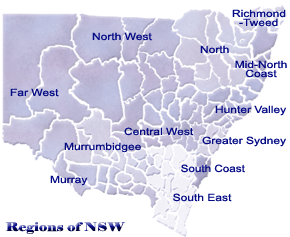We are always ready welcome volunteers for
the exciting WorldGenWeb project. One of the openings is
as a State/Territory Coordinator for this New
South Wales.
If you have an interest in helping us develope this
valuable resource by volunteering to serve as the
Coordinator, please contact the
National Coordinator.
VACANCY
::
NSW
State Coordinator
A
State Coordinator is responsible for overseeing
the day to day running of the GenWeb Project.
Duties include liasing with local Coordinators,
research institutions, libraries and associated
genealogy repositories. In addition the
Coordinator maintains the State website and
administers the state message board/query system (currently
messages are being redirected off-site until such
time as a new Coordinator is appointed).
Personal qualities include a love and
understanding of genealogy, an interest in web
design and the ability to communicate clearly and
effectively. As this is a supervisory role
the ability to manage, delegate and provide
informed guidance are essential attributes.
If you are interested in applying for the
position, please contact the
Australian
Coordinator for further details.
Would
you like to support the NSWGenWeb Project? Why not
consider adding one of our logos to your homepage?
For further information on how, Click
Here.
|
|
|

|
|
|
|
New
South Wales is Australia's most populous
state. It is located south-east of the country, north of Victoria and south of
Queensland. Founded in 1788, it originally comprised much of the Australian
mainland including the Islands Lord Howe and Norfolk. During the 19th century large areas were successively separated to form the British colonies of Tasmania (1825) South Australia (1836), Victoria
(1855) and Queensland (1859). In 1901 these colonies, along
with Western Australia, federated as the Commonwealth of Australia.
Between
1788 and 1842 approximately 80,0000 convicts were transported to
the penal settlement of New South Wales. Of these,
approximately 85% were men and 15% were women. Almost two thirds of
convicts were English, along with a small number of Scottish and
Welsh. Irish prisoners made up the remaining one third.
For the most part convicts sent to Australia were not violent
criminals. Many were supporters of Irish independence or victims
of social injustice. (Search
Records)
|
|
|
|
|
|
|